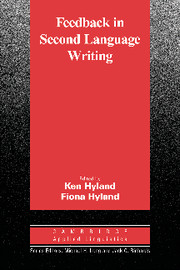Book contents
- Frontmatter
- Contents
- Contributors
- Series editors' preface
- Preface
- Chapter 1 Contexts and issues in feedback on L2 writing: An introduction
- I SITUATING FEEDBACK: SOCIOCULTURAL DIMENSIONS
- II SHAPING FEEDBACK: DELIVERY AND FOCUS DIMENSIONS
- III NEGOTIATING FEEDBACK: INTERPERSONAL AND INTERACTIONAL DIMENSIONS
- Chapter 10 Feedback and revision in second language writing: Contextual, teacher, and student variables
- Chapter 11 Interpersonal aspects of response: Constructing and interpreting teacher written feedback
- Chapter 12 Formative interaction in electronic written exchanges: Fostering feedback dialogue
- Chapter 13 Scaffolded feedback: Tutorial conversations with advanced L2 writers
- Chapter 14 “You cannot ignore”: L2 graduate students' response to discipline-based written feedback
- Author index
- Subject index
Chapter 12 - Formative interaction in electronic written exchanges: Fostering feedback dialogue
Published online by Cambridge University Press: 05 October 2012
- Frontmatter
- Contents
- Contributors
- Series editors' preface
- Preface
- Chapter 1 Contexts and issues in feedback on L2 writing: An introduction
- I SITUATING FEEDBACK: SOCIOCULTURAL DIMENSIONS
- II SHAPING FEEDBACK: DELIVERY AND FOCUS DIMENSIONS
- III NEGOTIATING FEEDBACK: INTERPERSONAL AND INTERACTIONAL DIMENSIONS
- Chapter 10 Feedback and revision in second language writing: Contextual, teacher, and student variables
- Chapter 11 Interpersonal aspects of response: Constructing and interpreting teacher written feedback
- Chapter 12 Formative interaction in electronic written exchanges: Fostering feedback dialogue
- Chapter 13 Scaffolded feedback: Tutorial conversations with advanced L2 writers
- Chapter 14 “You cannot ignore”: L2 graduate students' response to discipline-based written feedback
- Author index
- Subject index
Summary
In this chapter, formative feedback is examined within asynchronous exchanges between native and nonnative English-speaking (NS and NNS) master's degree students, using computer conferencing software. The styles of peer and tutor interaction in three separate tutorial groups are observed to promote different levels of discussion and reflection on content and academic writing. We analyze how the task sets and the tutors' input influence the development of these interactions and the degree of critical reflection exhibited by students in their feedback to each other. From these case studies, we argue that asynchronous computer-mediated communication (CMC) has the potential to help students learn the disciplinary norms of a new area of study in terms of content knowledge, expression, and epistemology. The realization of this potential is influenced by the role the tutor adopts and the tasks that are set. It is these aspects that we examine in detail through an analysis of feedback.
Much of the literature on learning highlights the importance of talk or dialogue, particularly as a way of scaffolding learning (Bruner, 1986). Here, we foreground the potential for written CMC to scaffold understanding of not only disciplinary knowledge but also disciplinary writing demands. The relative durability of CMC, in contrast to ephemeral face-to-face discussions, allows opportunities for students to reflect on contributions already posted to a conference and to consider and revise their own contributions before posting them to a group.
- Type
- Chapter
- Information
- Feedback in Second Language WritingContexts and Issues, pp. 225 - 245Publisher: Cambridge University PressPrint publication year: 2006



